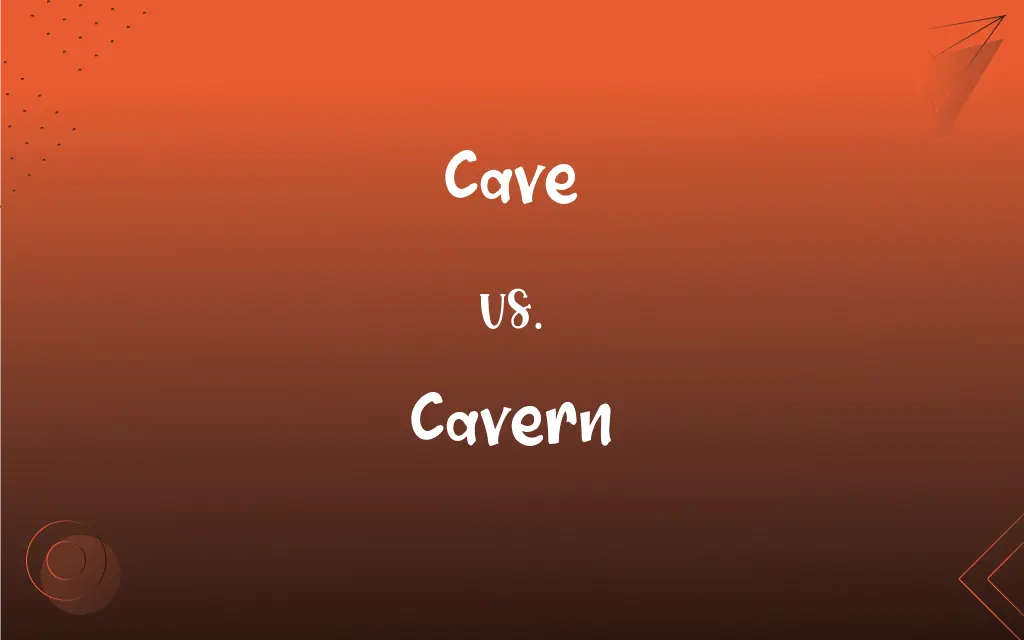Cave vs. Cavern: What's the Difference?
Edited by Janet White || By Harlon Moss || Updated on October 4, 2023
A cave is a natural underground space, while a cavern is a specific type of large and deep cave chamber.

Key Differences
A cave, in broad terms, refers to any natural underground space large enough for a human to enter. Cavern, on the other hand, specifically denotes a larger, often more spacious and deeper chamber within a cave system.
The word "cave" is versatile in its usage, describing everything from smaller rock shelters to extensive underground systems. The term "cavern" evokes an image of a vast, sometimes majestic, underground chamber that might feature stalactites, stalagmites, and other formations.
When one speaks of a cave, it might be any subterranean space, regardless of its size or depth. In contrast, a cavern often implies a more significant depth and grandeur, highlighting its impressive nature.
Geologists and spelunkers might explore both caves and caverns. However, while they'd expect caves in various shapes and sizes, they would anticipate caverns to be expansive and potentially more intricate.
Tourists visiting an underground attraction might be told they are entering a cave. But if they step into a vast chamber with awe-inspiring rock formations, they're likely in a cavern, a special feature of the cave system they're exploring.
ADVERTISEMENT
Comparison Chart
Definition
A natural underground space
A large, deep chamber within a cave
Size
Can vary from small to large
Typically large and deep
Implication
General term for underground spaces
Implies grandeur and spaciousness
Usage
Describes any subterranean space
Denotes a specific type of cave chamber
Associations
Rock shelters, tunnels
Stalactites, stalagmites, formations
ADVERTISEMENT
Cave and Cavern Definitions
Cave
A natural underground hollow.
They explored the dark cave with flashlights.
Cavern
A large, deep, and often ornate cave chamber.
The cavern echoed with the sound of dripping water.
Cave
A hollow or indentation in a surface.
The wave caused a small cave in the sand.
Cavern
A large storage or holding area.
They stored the artifacts in a cavernous warehouse.
Cave
A place of retreat or privacy.
His room was his personal cave.
Cavern
An underground chamber filled with petroleum or gas.
The drilling project located a vast cavern of natural gas.
Cave
To yield or submit under pressure.
He refused at first but eventually caved.
Cavern
A hollow or cavity in an organ or tissue.
The doctor examined the cavern in the patient's lung.
Cave
A wine storage vault or cellar.
He kept his finest wines in the cave below his house.
Cavern
Something resembling a large, dark space.
The night sky seemed like an endless cavern.
Cave
A hollow or natural passage under or into the earth, especially one with an opening to the surface.
Cavern
A large cave.
Cave
A storage cellar, especially for wine.
Cavern
A large underground chamber, as in a cave.
Cave
To dig or hollow out.
Cavern
To enclose in or as if in a cavern.
FAQs
Can "cave" also mean a retreat or private space?
Yes, "cave" can metaphorically refer to a personal retreat or private space.
Can a cave be small?
Yes, a cave can be any size, from small rock shelters to extensive systems.
Are all caverns open to the public?
No, while many are tourist attractions, some caverns are inaccessible or protected for conservation.
Is spelunking the act of exploring caves and caverns?
Yes, spelunking or caving is the recreational exploration of cave systems, including caverns.
Are caves always naturally occurring?
Most caves are natural, but man-made underground spaces can also be termed caves.
Do caves and caverns have the same geological formations?
Both can have formations like stalactites and stalagmites, but caverns are more likely to display a wider variety due to their size.
Is the word "cavernous" derived from "cavern"?
Yes, "cavernous" describes something resembling or suggestive of a cavern in size, shape, or atmosphere.
Why are caves important to scientists?
Caves offer insights into geology, biology, and even human history, preserving unique ecosystems and ancient artifacts.
Are caves and caverns safe to explore without experience?
No, exploring caves and caverns can be dangerous and is best done with proper training, equipment, and guidance.
Are all large caves referred to as caverns?
No, only specific, deep, and often ornate chambers within caves are called caverns.
Can "cave" also refer to a wine storage area?
Yes, "cave" can refer to a wine storage vault or cellar.
Is every cavern a cave?
Yes, every cavern is a specific type of cave chamber.
Can "cavern" have a medical connotation?
Yes, "cavern" can refer to a hollow or cavity in an organ or tissue.
Do animals live in caverns?
Yes, many animals, especially bats, can inhabit caverns.
Can a cavern be a man-made structure?
While most caverns are natural, large man-made underground chambers can also be colloquially termed caverns.
Are caverns typically more impressive than general caves?
Caverns, due to their size and depth, often have more intricate formations making them impressive.
Are caves always dark?
Most caves are dark since they are underground, but entrances or portions near the surface may have light.
What are the typical features of a cavern?
Caverns typically feature large chambers, greater depths, and often stalactites, stalagmites, or other formations.
Can caves be underwater?
Yes, there are underwater caves known as submerged or subaqueous caves.
How are caves and caverns formed?
They're often formed by the dissolution of limestone or other soluble rocks and can also result from volcanic activity.
About Author
Written by
Harlon MossHarlon is a seasoned quality moderator and accomplished content writer for Difference Wiki. An alumnus of the prestigious University of California, he earned his degree in Computer Science. Leveraging his academic background, Harlon brings a meticulous and informed perspective to his work, ensuring content accuracy and excellence.
Edited by
Janet WhiteJanet White has been an esteemed writer and blogger for Difference Wiki. Holding a Master's degree in Science and Medical Journalism from the prestigious Boston University, she has consistently demonstrated her expertise and passion for her field. When she's not immersed in her work, Janet relishes her time exercising, delving into a good book, and cherishing moments with friends and family.































































